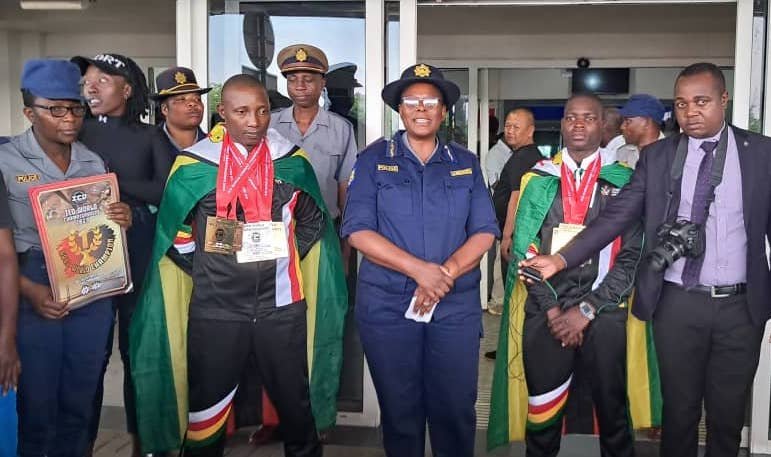News
Tinashe Mutarisi Urges Action Against Drug Abuse in Music Industry
To combat this pandemic effectively, it is imperative for the entertainment industry to play a pivotal role in disseminating awareness through music.
The Zimbabwean government recently highlighted the critical issue of drug and substance abuse, categorizing it as a pressing pandemic that demands urgent action. Notably, entrepreneur and music mogul Tinashe Mutarisi took to social media strongly advocating for a more conscientious approach within the entertainment industry. In a recent social media post, Mutarisi emphasised the profound impact of music on societal norms, urging bloggers and music promoters to steer clear of endorsing artists whose lyrics glorify drugs.
Tinashe Mutarisi is a prominent figure in the entertainment industry, serving as the CEO of Nash TV, a leading visual entertainment media company in Zimbabwe. His influence within the industry makes his voice particularly influential in addressing this prevailing social concern. Nash TV’s collaboration with artists like Saintfloew, a rising star within the Zimbabwean music scene, had initially propelled the artist to significant popularity. However, recent news about Saintfloew’s struggle with drug addiction, and subsequent rehabilitation with Nash’s support, brought the issue of substance abuse to the forefront once again.
The drug problem in Zimbabwe, once a less prevalent issue, has now become a considerable challenge, particularly affecting vulnerable communities like Mbare and Chitungwiza. Unemployment and economic instability are contributing factors, leading to a lack of support systems and affordable rehabilitation facilities, thus exacerbating the crisis.
According to Dr Johannes Marisa, president of the Medical and Dental Practitioners Council of Zimbabwe, the surge in substance abuse-related mental health cases has reached alarming levels, causing a strain on the country’s healthcare system. The increase in cases is not confined to adults alone, as teenagers, facing their own challenges, are also falling victim to substance abuse, particularly with easily accessible prescription drugs and over-the-counter medications.
The prevalent use of cough syrup, popularly known as Bronclear, has been a significant concern, although the emergence of even more perilous substances such as crystal meth has presented a newer and more formidable challenge. Studies have shown that approximately 65% of hospital admissions in public hospitals are linked to drug abuse. This figure is concerning given other unrelated challenges our health system is currently faced with.
To combat this pandemic effectively, it is imperative for the entertainment industry to play a pivotal role in disseminating awareness through music. Educating the youth about the perils of drug abuse is crucial to prevent early addiction, safeguarding the well-being of the country’s most valuable resource – its young people. With Tinashe Mutarisi and the government spearheading the efforts, collective action from all sectors is indispensable in curbing the spread of this detrimental crisis. It’s time for everyone to unite in this fight against substance abuse and cultivate a healthier social environment for Zimbabwe’s future generations.
News
Toxicity on X Platform, Zimbos Virtual Fights
In reality, the toxicity on X has left scars that can be hard to heal.

In the age of social media, where platforms like X (formerly known as Twitter) connect people across the globe, Zimbabweans have found a unique virtual battleground to settle their scores. The keyboard has become their weapon of choice, and in this digital arena, they grab, grapple, type insults, and proudly showcase their political pedigree to win a following.
This online space has become the breeding ground for controversial influencers, with figures like Sadhaya feeling right at home. Here, toxicity is not just prevalent; it’s rewarded with popularity. Followers have become martyrs for their chosen leaders, ready to pounce at the slightest provocation. Self-made politicians and impassive individuals strut these cyber streets like kings and queens, vying for the virtual throne. Noone is safe on X streets, even Elon Musk himself is always under attack from free account subscribers.
In this virtual environment, everything related to politics happens here. Political campaigns, voting, results tabulations, and even the announcement of election results are conducted within the confines of this digital space. Elon Musk’s entry into this domain added a new twist, as he began offering incentives to creators. The coveted “blue tick” gang emerged, with the criteria to be eligible for payouts being an X Premium (Blue) subscriber, receiving at least 15 million total impressions on your posts in the last three months, having a minimum of 500 followers, and being at least 18 years old. While this brought a new level of excitement, it also exacerbated the existing toxicity.
Content creators, enticed by the prospect of revenue, flooded the platform. It’s worth noting that toxic posts often garner massive followings, setting the stage for a race to reach that coveted 15 million impressions. X, in essence, became a fierce arena for digital competition, where a good sport could rise to become a person of great influence, positively or otherwise. Money was the undeniable motivator.
Within the diverse X platform, there are spaces dedicated to discussing various subjects. The impact of these spaces, however, varies depending on the topic at hand. Zimbabweans, it seems, are still stuck in election mode. The buzz on the platform revolves around themes like Shabangu and sanctions, reflecting the nation’s ongoing political turmoil.
In an ideal world, Zimbabweans would love each other virtually, transcending the boundaries of this digital battleground. In reality, the toxicity on X has left scars that can be hard to heal. But let’s not forget that the people behind the tweets are not devils; they’re products of their digital environment. Perhaps, if they were to meet in person, they might share a meal and laugh off the Twitter-induced wounds. The virtual world can be a reflection of our collective consciousness, and for Zimbabweans, X mirrors both their struggles and their hopes for a better future.
News
World Champions Mashaya & Fambira Receive Heroes Welcome
Master Mashaya and his dedicated student, Sempai Fambira’s outstanding victory in England has firmly established Zimbabwe on the global map of Martial Arts.

The First African Kobudo Team to be crowned World Champions in Weaponry Martial Arts arrived safely back in their home country yesterday. The Zimbabwe Kobudo team, led by Master Wilfred Mashaya and his dedicated student Vincent Fambira, received a warm welcome from their fellow countrymen. A multitude of people gathered at the RGM International Airport to honor the two Zimbabwean heroes who had not only raised their nation’s flag high on the global stage but also garnered a total of 11 medals, comprising 8 gold, 2 silver, and 1 bronze. Affiliated with the Zimbabwe Karate Union (ZKU), the Zimbabwe Martial Arts Kobudo Team’s triumph has brought immense pride to the nation.
The notable figures present at the airport to greet the World Champions included the esteemed Zimbabwe Republic Police Command, led by Commissioner Priscilla Makotose, along with Assistant Commissioner Ali Simbarashe Hondo, Assistant Commissioner Paul Nyathi, Chief Superintendent Laxon Sibanda, Superintendent Abel Chimukoko, Superintendent Shamiso Jaricha, and other ZRP commanders and members. Commissioner Priscilla Makotose, representing the Commissioner General of Police Cde Tandabantu Godwin Matanga, had been delegated to extend a special welcome to the two Zimbabwean World Champions.
The welcoming crowd also consisted of members of the Zimbabwe Karate Union, various martial artists from different organizations, bodybuilders, sports enthusiasts from diverse disciplines, members of the Zim Ninja Academy, media personnel, members of the ZRP, as well as family, friends, and relatives. Notably, Master Mashaya’s mother had journeyed all the way from the rural areas, traveling nearly 400 km from Gokwe, to greet her victorious son. Overwhelmed with pride, she was moved to tears at her son’s remarkable achievements. The depth of a mother’s love was poignantly evident in her dedicated efforts to be there for her son.
The younger generation, inspired by Master Mashaya’s remarkable journey, also joined in the welcome. Many of the children present at the airport viewed the Zim Ninja as their role model, with aspirations to follow in his footsteps within the realm of martial arts. Various performances and displays were organized by different groups at the airport to celebrate and honor the two World Champions, creating an atmosphere filled with joy and elation.
Master Mashaya and his dedicated student, Sempai Fambira’s outstanding victory in England has firmly established Zimbabwe on the global map of Martial Arts. Their impressive performances have garnered admiration from various countries worldwide, with accolades pouring in, particularly on social media platforms.
The ICO World Martial Arts Championships, which took place from October 20 to October 22, were hosted at the Allam Sports Centre, situated at the University of Hull in Hull City, England. The event was organized under the leadership of Mr. Andrew Hennessy, representing the International Combat Organisation based in England. More than 15 countries and over 500 athletes participated in the championship, including teams from England, Wales, Ukraine, Germany, France, Lebanon, Hungary, Ireland, Scotland, Cyprus, Isle of Man, Portugal, Spain, and Brazil, among others.
Master Mashaya’s individual excellence shone through as he claimed 3 Gold Medals and one Silver Medal in the Black Belts Individual Weaponry Categories. His student, Fambira, emulated his Master’s success by securing 3 Gold Medals and one Silver Medal in the 17 Years Individual Weaponry Categories. As a team, they achieved further glory, taking home 2 Gold Medals and one Bronze Medal in the Team Weaponry Categories. Master Mashaya expressed his elation at Fambira’s performance, viewing it as a testament to the growth of Kobudo Martial Arts, a discipline he introduced to Zimbabwe in 2016 after his triumphant endeavours in Russia. The categories they excelled in featured weapons like Katana Swords, Chuckle Sticks/Nunchaku, Tonfa, Kama, Sai, and Bo, among others. Their proficiency in these areas made them stand out, with very few individuals in Africa possessing such expertise.
The resounding success of the Mashaya-Fambira duo has ignited a sense of national pride. They pledged to continue their remarkable journey, promising to uphold the Zimbabwean flag on the world stage in Weaponry Martial Arts, provided they receive the necessary sponsorship. Their resounding message is that they attribute their success to unwavering faith in the Almighty Lord and to the values of hard work, humility, respect for others, commitment, focus, and above all, the discipline that propels one to scale new heights in the realm of sports.
News
A Lucrative Opportunity in Gold Mining, Zimbabwe’s Golden Future Within
As Zimbabwe steers towards a reliance on its extractive industry, gold emerges as the foremost foreign currency earner, closely followed by tobacco.

Zimbabwe’s rich and bountiful lands harbor not only a wealth of gold and diamonds but also a realm of untapped potential in the mining sector. Despite the inherent risks and the challenging nature of the industry, the allure of golden returns continues to draw in ambitious individuals seeking their fortune. Yet, the path to prosperity in Zimbabwe’s gold mining industry is not without its share of obstacles, from political turmoil to safety concerns, reflecting the urgent need for stringent regulations and safety protocols.
Artisanal miners in Zimbabwe echo a common sentiment, advocating a ‘just do it’ attitude when it comes to reaping the rewards of the gold rush. Their advice? A modest investment in equipment such as generators, picks, shovels, and compressors can pave the way for a potential windfall. Nevertheless, the perils of collapsing mining shafts claim the lives of many young aspirants, highlighting the critical necessity for comprehensive safety measures and proactive regulations in the mining landscape.
With an estimated 13 million tonnes of proven gold deposits lying beneath its surface, Zimbabwe stands poised at the brink of a golden era. Despite having tapped a mere 580 tonnes since 1980, the country’s potential remains largely untapped, offering an enticing prospect for those willing to seize the opportunity. As foreign investors join the race for Zimbabwean gold, the country’s mining towns bear witness to a renewed surge in activity, with the precious metal now serving as a vital hedge against the global financial risks stemming from the aftermath of the COVID-19 pandemic.
As Zimbabwe steers towards a reliance on its extractive industry, gold emerges as the foremost foreign currency earner, closely followed by tobacco. However, amidst the nation’s economic and political fluctuations, sustainable resource governance emerges as a pressing concern, demanding thoughtful policies to ensure equitable distribution of wealth among all strata of society.
In the depths of Zimbabwe’s gold mines lie stories of chance discoveries and long-lost treasures, such as ore-laden wagons abandoned during the Second World War. While tales of German explorers hastily fleeing during wartime linger, the veracity of these accounts remains to be substantiated by concrete evidence. The tales of underground skeletons and buried mines resonate as cautionary echoes of a tumultuous past, underscoring the need for comprehensive historical research to unearth the truth.
The appeal of immediate cash payments in US dollars has enticed numerous families to flock to Zimbabwe’s artisanal and small-scale gold mining industry, often leaving behind their ancestral homes in pursuit of a share of the lucrative pie. Unlike in many other nations, the Zimbabwean government has embraced this form of mining, allowing the masses to participate, provided they obtain the necessary licenses.
Witnessing a surge in construction activities, mining towns stand as testaments to the newfound prosperity proliferating through the industry. As the ranks of millionaires swell, the wealth predominantly stems from the pursuit of this precious metal. Gold, with its relatively low capital requirements, emerges as the top choice for many, overshadowing other capital and labor-intensive mineral prospects within Zimbabwe’s rich mineral portfolio.
In embracing its mining potential, Zimbabwe faces a pivotal moment, where the prudent management of resources and an unwavering commitment to safety and sustainability will shape the course of its golden destiny.


















